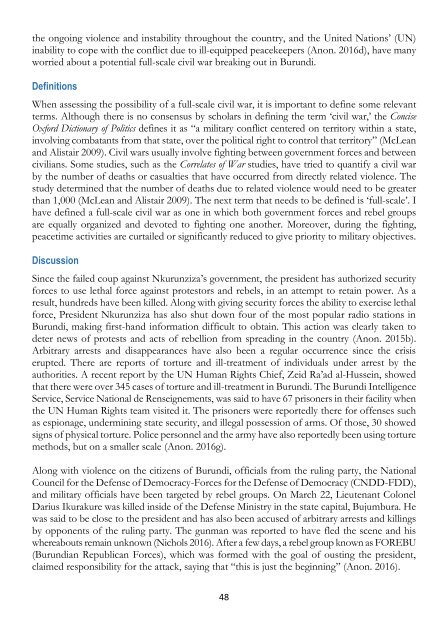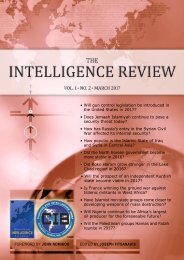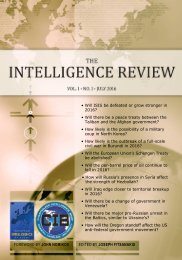The Intelligence Review | vol. 1 | iss. 1 |
This volume is the product of a collaboration between the European Intelligence Academy (EIA) and the Chanticleer Intelligence Brief (CIB), a student-run initiative supported by the Department of Politics at Coastal Carolina University in Conway, South Carolina, United States. Eleven CIB analysts tackle some of the most pressing and timely questions confronting intelligence observers today. Topics range from the price of oil to political stability in Venezuela, from the territorial cohesion of Iraq to the future of the Islamic State, and many other pressing subjects that feature daily in news headlines. CIB analysts propose carefully crafted and informed forecasts that outline future developments in some of the world's most unpredictable hot spots.
This volume is the product of a collaboration between the European Intelligence Academy (EIA) and the Chanticleer Intelligence Brief (CIB), a student-run initiative supported by the Department of Politics at Coastal Carolina University in Conway, South Carolina, United States. Eleven CIB analysts tackle some of the most pressing and timely questions confronting intelligence observers today. Topics range from the price of oil to political stability in Venezuela, from the territorial cohesion of Iraq to the future of the Islamic State, and many other pressing subjects that feature daily in news headlines. CIB analysts propose carefully crafted and informed forecasts that outline future developments in some of the world's most unpredictable hot spots.
- No tags were found...
You also want an ePaper? Increase the reach of your titles
YUMPU automatically turns print PDFs into web optimized ePapers that Google loves.
the ongoing violence and instability throughout the country, and the United Nations’ (UN)<br />
inability to cope with the conflict due to ill-equipped peacekeepers (Anon. 2016d), have many<br />
worried about a potential full-scale civil war breaking out in Burundi.<br />
Definitions<br />
When assessing the possibility of a full-scale civil war, it is important to define some relevant<br />
terms. Although there is no consensus by scholars in defining the term ‘civil war,’ the Concise<br />
Oxford Dictionary of Politics defines it as “a military conflict centered on territory within a state,<br />
in<strong>vol</strong>ving combatants from that state, over the political right to control that territory” (McLean<br />
and Alistair 2009). Civil wars usually in<strong>vol</strong>ve fighting between government forces and between<br />
civilians. Some studies, such as the Correlates of War studies, have tried to quantify a civil war<br />
by the number of deaths or casualties that have occurred from directly related violence. <strong>The</strong><br />
study determined that the number of deaths due to related violence would need to be greater<br />
than 1,000 (McLean and Alistair 2009). <strong>The</strong> next term that needs to be defined is ‘full-scale’. I<br />
have defined a full-scale civil war as one in which both government forces and rebel groups<br />
are equally organized and devoted to fighting one another. Moreover, during the fighting,<br />
peacetime activities are curtailed or significantly reduced to give priority to military objectives.<br />
Discussion<br />
Since the failed coup against Nkurunziza’s government, the president has authorized security<br />
forces to use lethal force against protestors and rebels, in an attempt to retain power. As a<br />
result, hundreds have been killed. Along with giving security forces the ability to exercise lethal<br />
force, President Nkurunziza has also shut down four of the most popular radio stations in<br />
Burundi, making first-hand information difficult to obtain. This action was clearly taken to<br />
deter news of protests and acts of rebellion from spreading in the country (Anon. 2015b).<br />
Arbitrary arrests and disappearances have also been a regular occurrence since the crisis<br />
erupted. <strong>The</strong>re are reports of torture and ill-treatment of individuals under arrest by the<br />
authorities. A recent report by the UN Human Rights Chief, Zeid Ra’ad al-Hussein, showed<br />
that there were over 345 cases of torture and ill-treatment in Burundi. <strong>The</strong> Burundi <strong>Intelligence</strong><br />
Service, Service National de Renseignements, was said to have 67 prisoners in their facility when<br />
the UN Human Rights team visited it. <strong>The</strong> prisoners were reportedly there for offenses such<br />
as espionage, undermining state security, and illegal possession of arms. Of those, 30 showed<br />
signs of physical torture. Police personnel and the army have also reportedly been using torture<br />
methods, but on a smaller scale (Anon. 2016g).<br />
Along with violence on the citizens of Burundi, officials from the ruling party, the National<br />
Council for the Defense of Democracy-Forces for the Defense of Democracy (CNDD-FDD),<br />
and military officials have been targeted by rebel groups. On March 22, Lieutenant Colonel<br />
Darius Ikurakure was killed inside of the Defense Ministry in the state capital, Bujumbura. He<br />
was said to be close to the president and has also been accused of arbitrary arrests and killings<br />
by opponents of the ruling party. <strong>The</strong> gunman was reported to have fled the scene and his<br />
whereabouts remain unknown (Nichols 2016). After a few days, a rebel group known as FOREBU<br />
(Burundian Republican Forces), which was formed with the goal of ousting the president,<br />
claimed responsibility for the attack, saying that “this is just the beginning” (Anon. 2016).<br />
48





